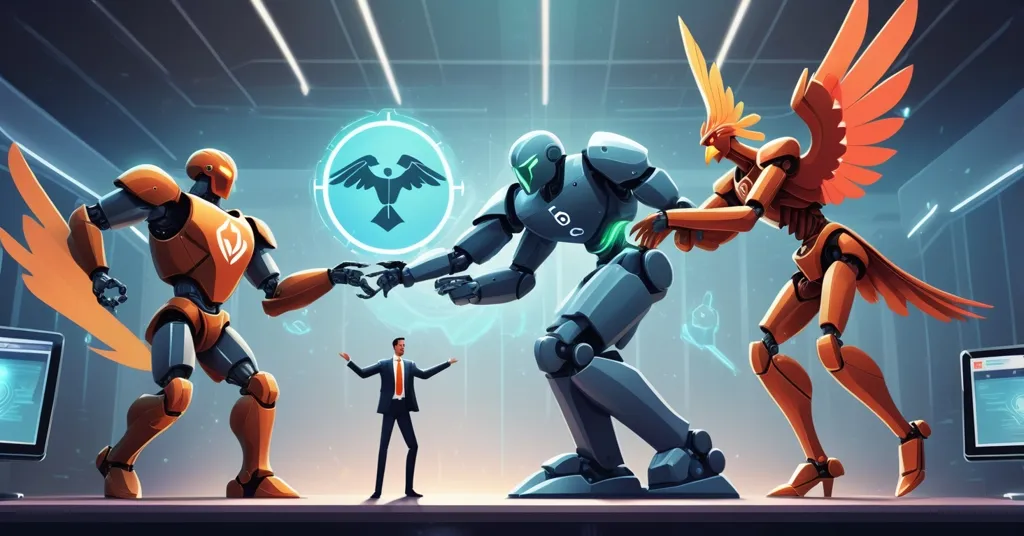Elon Musk’s xAI Challenges Apple in App Store Antitrust Clash over ChatGPT Bias

Elon Musk’s xAI Takes Aim at Apple in App Store Antitrust Battle
Elon Musk is gearing up for a showdown with Apple, accusing the tech giant of rigging the App Store game by favoring OpenAI’s ChatGPT while shutting out his xAI’s chatbot Grok and the X platform from prime promotional real estate. Calling it an “unequivocal antitrust violation,” Musk has threatened a lawsuit that could send shockwaves through Big Tech, echoing the same battles Bitcoin fought against centralized gatekeepers in its early days.
- Core Complaint: Musk claims Apple unfairly promotes OpenAI in the App Store’s “Must Have” section while blocking xAI’s Grok and X from similar visibility.
- Legal Threat: xAI plans to sue Apple, alleging anticompetitive behavior that stifles innovation.
- Big Picture: This fight mirrors broader struggles against tech monopolies, with parallels to crypto’s own history of exclusion.
Apple’s App Store: Gatekeeper or Kingmaker?
Musk’s beef with Apple centers on the App Store, a digital marketplace that doesn’t just host apps—it decides their fate. With over a billion users worldwide, Apple’s curated sections like “Must Have” act as a spotlight, catapulting featured apps to viral status while others languish in obscurity. For those new to this dynamic, think of it like shelf placement in a supermarket: prime eye-level spots drive sales, while the bottom rack gathers dust. According to Musk, despite Grok ranking as the sixth most popular free app on iPhones in the US, it’s conspicuously absent from these high-visibility zones, a concern echoed in discussions about Apple App Store ‘Must Have’ section criteria and bias allegations. Meanwhile, OpenAI’s ChatGPT sits atop the heap, enjoying Apple’s editorial blessing. Musk has also pointed out that X, which he claims is the top news app globally, gets the same cold shoulder. Smelling a rat, he’s openly questioned whether Apple is “playing politics” rather than basing decisions on user demand or app performance. In his own words, this isn’t just unfair—it’s an
“unequivocal antitrust violation.”
For clarity, let’s unpack what’s at stake. Grok, developed by Musk’s xAI, is an AI chatbot—a virtual assistant powered by machine learning to answer questions with often unfiltered, outside-the-box responses. ChatGPT, from OpenAI, plays a similar role but with a more polished, mainstream appeal. Being excluded from Apple’s promotional sections isn’t just a snub; it’s a massive barrier to reaching millions of potential users. And when Musk hints at political motives, he’s suggesting Apple might be prioritizing corporate alliances or ideological alignment over hard data like downloads or engagement. This suspicion isn’t baseless—Apple struck a deal with OpenAI in June 2024 to integrate ChatGPT into its devices, a partnership Musk publicly slammed, even threatening to ban Apple products at Tesla, SpaceX, and X. Is this exclusion a coincidence, or a deliberate move to favor a partner? Musk clearly leans toward the latter, as highlighted in recent reports of Musk’s intent to sue Apple over antitrust issues.
Musk’s Track Record: A History of Taking on Titans
This isn’t Musk’s first swing at Big Tech’s heavyweights. Earlier in 2025, he filed a lawsuit against OpenAI, its CEO Sam Altman, and Microsoft, accusing them of violating the Sherman Antitrust Act—a US law from 1890 aimed at preventing monopolies and unfair competition. In that case, Musk claimed OpenAI’s shift from a nonprofit to a for-profit entity, coupled with questionable contracts, choked out competition in the AI sector. He didn’t hold back, alleging personal conflicts of interest for Altman, pointing to shady deals with companies like Rain AI, Humane, Limitless, and Reddit that supposedly padded Altman’s wallet at the expense of fair play. That legal spat painted Musk as a champion of innovation against centralized power, with heated debates captured in online discussions about Musk’s legal battle with OpenAI and Altman. Now, he’s reloaded with Apple in his sights. The pattern is clear: Musk sees himself as the underdog battling for a level playing field, whether it’s in AI or social media platforms.
But let’s pump the brakes before we crown him a hero. While Musk’s accusations against Apple carry weight, there’s no smoking gun to back up claims of political bias or deliberate suppression. Apple hasn’t responded to his latest jabs, nor have OpenAI or xAI provided hard evidence beyond app ranking disparities. What kind of proof would even seal the deal here? Internal emails, algorithm data, or explicit curation guidelines from Apple could make or break Musk’s case—if a lawsuit ever materializes. Until then, we’re left with Musk’s word versus Apple’s silence, quieter than a Bitcoin miner during a blackout, though public curiosity about the conflict is evident on platforms like Quora discussing Musk’s clash with Apple.
Apple’s Baggage: A Legacy of Legal Heat
Apple isn’t exactly a stranger to controversy over its App Store antics. In April 2025, a federal judge in California ruled that Apple violated a court order from the 2021 Epic Games lawsuit, which demanded reforms to boost competition in app distribution and payments. That case, brought by the Fortnite maker, exposed how Apple’s 30% cut on transactions and strict rules often kneecap developers. On top of that, the European Commission hit Apple with a €500 million fine the same month for breaching digital competition laws by blocking developers from offering cheaper alternatives outside the App Store. These aren’t direct proof of Musk’s claims, but they paint a damning picture of a company that’s been swinging its market power like a wrecking ball—and regulators are finally taking notice, as detailed in analyses of Apple’s alleged anticompetitive behavior toward xAI.
These precedents matter because they show Apple’s track record of prioritizing control over openness. Even after legal rulings, tangible change has been slow. Apple tweaked some policies post-Epic Games, like allowing external payment links, but critics argue it’s still playing hardball with compliance. For Musk, this history likely fuels his belief that Apple’s curation isn’t just editorial—it’s a calculated move to pick winners and losers. Whether that’s true or just convenient for his narrative remains up for debate, with further insights available in coverage of Musk’s potential lawsuit against Apple.
Crypto Parallels: Echoes of Bitcoin’s Early Struggles
For those of us in the crypto space, Apple’s iron grip over app visibility should feel eerily familiar. It’s not just AI upstarts like xAI getting squeezed—it’s a stark reminder of the roadblocks Bitcoin and blockchain tech slammed into against centralized gatekeepers. Back in the early 2010s, Bitcoin wallet apps were routinely yanked from app stores or buried under restrictive policies, with Apple citing “unregulated currency” concerns while happily hosting fiat banking apps. Even today, decentralized finance (DeFi) platforms—systems built on blockchain for lending, trading, or borrowing without banks—like Uniswap or Coinbase, wrestle with Apple’s rules on in-app purchases. These often force clunky workarounds that baffle users and throttle adoption.
Here’s why this hits home: Apple’s policies, like demanding a 30% cut on transactions or blocking features that don’t bow to its framework, don’t just stifle innovation—they dictate the game. If Musk’s legal threat forces Apple to loosen its chokehold, it could be a game-changer for crypto apps. Decentralized apps (dApps) and wallets might finally reach mainstream audiences without jumping through corporate hoops. For fans of effective accelerationism, this is the kind of barrier-busting we crave—smashing centralized walls to speed up disruptive tech. But let’s not get overly rosy. Apple often hides behind “user protection” as a justification, and not without cause—scammy crypto apps have burned plenty of people. The real question is whether their curation is genuinely about safety or just a slick way to protect their bottom line and cozy up to established players. Sounds a lot like how traditional finance dismissed Bitcoin as a fraud while guarding their turf, doesn’t it? History might not repeat, but it sure as hell rhymes.
The Dark Side: Data Privacy and Power Plays
Zooming out, this spat between Musk and Apple isn’t just about app rankings—it’s a window into deeper power struggles in tech. One angle worth chewing on is data privacy, a core concern for many in the crypto community who value freedom and sovereignty. AI chatbots like ChatGPT and Grok hoover up massive amounts of user data for training, often with murky transparency on how it’s used. If Apple’s promotion decisions steer millions toward one app over another, they’re indirectly shaping which companies get the lion’s share of personal info. Given Apple’s partnership with OpenAI, is their push for ChatGPT amplifying a data collection giant at the expense of competitors like Grok, which markets itself on a more unfiltered, outsider ethos? It’s a unsettling thought for anyone who’s fought for privacy in the blockchain space, and community reactions can be explored in Reddit threads on Musk’s antitrust grievances with Apple.
Playing devil’s advocate, we’ve also got to scrutinize Musk’s motives. As the owner of both xAI and X, he’s hardly a neutral bystander. Is this crusade really about fairness in the AI market, or is it a strategic push for his own business interests, especially since X is also getting snubbed by Apple? It’s a legit concern, even if his broader point about competition rings true. On the flip side, Apple might argue their curation prioritizes user safety or app stability—ChatGPT’s polished interface versus Grok’s raw style could justify editorial picks. Without hard data on their decision-making, though, that’s just speculation. What’s clear is that in a landscape where a single algorithm tweak can crown kings or bury challengers, the stakes couldn’t be higher.
What’s Next? A Lawsuit with Ripple Effects
As of now, Musk’s threat of “immediate legal action” against Apple remains just that—a threat. No lawsuit has been filed, but the mere possibility is already stirring the pot. If it comes to pass, this case could force regulators to take a harder look at App Store policies, potentially prying open doors for smaller, disruptive projects across tech sectors. For the crypto world, that’s a tantalizing prospect: less gatekeeping could mean more visibility for blockchain apps, from wallets to DeFi platforms, that have long been stifled by Apple’s rules. It aligns with the spirit of effective accelerationism—tearing down centralized barriers to fast-track innovation, a theme also touched on in broader context about Musk’s influence in tech controversies.
Even if this fizzles out as another Musk-driven X storm, it’s a loud reminder of the power imbalances in tech. A successful challenge could redefine how app distribution platforms handle competition, especially in bleeding-edge fields like AI and decentralized tech. But there’s a flip side: prolonged legal battles often drain resources and distract from actual innovation—something Bitcoin’s early pioneers know all too well from fighting regulatory wars. Whether this becomes a landmark case or a headline-grabbing stunt, one thing’s certain—Musk isn’t one to shy away from a fight, no matter how Goliath-sized the foe. Buckle up; this could get ugly.
Key Takeaways and Burning Questions
- Why is Elon Musk targeting Apple with antitrust claims?
Musk accuses Apple of favoring OpenAI’s ChatGPT in the App Store’s “Must Have” section while excluding xAI’s Grok and X, labeling it an anticompetitive move possibly driven by politics or corporate ties. - How does this dispute mirror crypto’s own battles?
Apple’s control over app visibility echoes how traditional finance and tech gatekeepers sidelined Bitcoin and blockchain apps, using restrictive policies to hinder disruptive innovation. - Could Musk’s motives be more than just fairness?
While his fight for competition aligns with decentralization ideals, owning xAI and X raises questions about whether personal business gains are also driving this clash with Apple. - What might a lawsuit mean for blockchain and crypto apps?
If Musk’s challenge weakens Apple’s App Store grip, it could pave the way for greater visibility of dApps, wallets, and other decentralized tech, accelerating mainstream adoption. - Why should crypto enthusiasts care about AI app disputes?
Beyond parallels in gatekeeping, Apple’s promotion choices could influence which AI firms dominate user data collection—a privacy concern that hits close to home for blockchain advocates.



